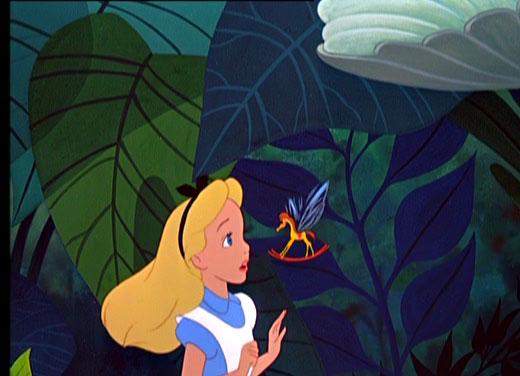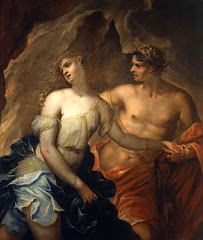Alice in Wonderland
Bored and drowsy on a hot summer's day, a little Victorian girl suddenly finds herself transported underground into a totally strange 'wonderland'.
Every time she finds herself altering in size. She meets a bewildering succession of animals and other creations, behaving like human beings but talking to her in riddles. Everything in this surreal dreamworld is like a parody or distortion of something familiar.
But just as this dream seems finally to be turning into a death-threatening nightmare, with the Queen of Hearts in the courtroom scene angrily shouting 'off with her head' and all the card rising up into the air and 'flying down upon her', Alice is jerked back to the reality of her familiar world by waking up, as if from a dream.
Every time she finds herself altering in size. She meets a bewildering succession of animals and other creations, behaving like human beings but talking to her in riddles. Everything in this surreal dreamworld is like a parody or distortion of something familiar.
But just as this dream seems finally to be turning into a death-threatening nightmare, with the Queen of Hearts in the courtroom scene angrily shouting 'off with her head' and all the card rising up into the air and 'flying down upon her', Alice is jerked back to the reality of her familiar world by waking up, as if from a dream.
VOYAGE AND RETURN
The essence of the Voyage and Return story is that its hero or heroine travel out of the familiar, everyday 'normal' surroundings into another world completely cut off from the first, where everything seems disconcertingly abnormal.
At first the strangeness of this new world, with its freaks and marvels, may seem diverting, even exhilarating, if also highly perplexing. But gradually a shadow intrudes.
The hero or heroine feels increasingly threatened, even trapped until eventually (usually by way of a 'thrilling escape') they are released from the abnormal world, and can return to the safety of the familiar world where they began.
At first the strangeness of this new world, with its freaks and marvels, may seem diverting, even exhilarating, if also highly perplexing. But gradually a shadow intrudes.
The hero or heroine feels increasingly threatened, even trapped until eventually (usually by way of a 'thrilling escape') they are released from the abnormal world, and can return to the safety of the familiar world where they began.
Orpheus
Orpheus, after his journey through the underworld, has to leave behind him forever his great love Eurydice. Having gone there to bring her back, he is told he can do soon one condition: that, as he returns to the upper world, he keeps looking forward and does not look back.
At the last moment, just before he steps out into the daylight, he looks back to see if Eurydice following him. Instead of coming back joyful, wit his life immeasurably renewed, Orpheus returns from his journey loveless, alone and untransformed.
At the last moment, just before he steps out into the daylight, he looks back to see if Eurydice following him. Instead of coming back joyful, wit his life immeasurably renewed, Orpheus returns from his journey loveless, alone and untransformed.
A Few Examples
H.G. Well's The Time Machine, Beatrix Potter's Peter Rabbit, Coleridge's The Rime of the Ancient Mariner, C.S. Lewis's The Lion, the Witch and the Wardrobe, Frank Baum's The Wizard of Oz.
The pattern of such a story unfolds like this:
1. Anticipation Stage and 'fall' into the other world-At first the hero/heroine are likely to be in some state which lays them open to a shattering new experience. Their consciousness is in some way restricted. They may just be young and naive, actively curious and looking for something unexpected, bored, drowsy, reckless. For whatever reason, they find themselves out of their familiar, limited existence, into a strange world, unlike anything they have experience before.
2. Initial fascination or Dream Stage-At first their exploration of this disconcerting new world may be exhilarating, because it is so puzzling and unfamiliar. But it is never a place in which they can feel at home.
3. Frustration Stage-Gradually the mood of adventure changes to one of frustration, difficulty and oppression. A shadow begins to intrude, which becomes increasingly alarming.
4. Nightmare Stage-The shadow becomes so dominating that it seems to pose a serious threat to the hero/heroine's survival.
5. Thrilling Escape and Return-Just when the that closing in on the hero/heroin becomes too much to bear, they make their escape form the other world back to where they started. At this point the real question posed by the adventure is: how far have they learned or gained anything from their experience? Have they been fundamentally change, or was it all 'just a dream'?

